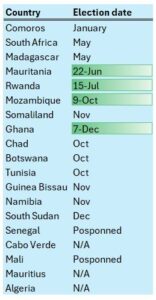By Patrick Markey and Joel Olatunde Agoi From airlines in Nigeria to shoppers in Malawi, Africans are feeling the...
1248 issue: week ending 18 March 2022
Another Wasted Year Ahead
With MondAfrique
The island nation of Comoros on the Indian ocean is the first African nation to inaugurate the election season on the  African continent. And if the Comoros island is an example of what’s to come, Africa’s elections are going to count for nothing, with a few notable exceptions.
African continent. And if the Comoros island is an example of what’s to come, Africa’s elections are going to count for nothing, with a few notable exceptions.
In the Comoros, the incumbent President Azali Assoumani was declared on the 16 January 2024, the winner of rigged elections that triggered riots. As of January 18, Comoros witnessed a second day of turmoil resulting in one fatality and at least six injuries. Opposition parties contested the election results, alleging fraud and bias in favor of Assoumani, who, having changed the constitution in 2018 to bypass term limits, secured a fourth term with 62.97% of the vote. Accusations of dissent crackdown and protest bans were leveled against Assoumani, who also chairs the African Union.
President Assoumani and the Comoros are a template of what African politics looks like. African leaders have no interest in quitting their presidential seats without upheaval. Aside from some exceptions, there is no such thing as smooth presidential transition. Assoumani of the Comores has been in power since 1999.
So 2024 should be a record election year for Africa. Twenty countries, accounting for 346 million voters will be called to participate to elections that will mostly be rigged and decided in advance.
However, for those of you who live un western nations and where elections are the backbone of governance, it is worth noting that Africa has long been looking to distance itself from western-style democracy. Our colleagues from MondAfrique noted, rightly so, the for the most part, the forthcoming African elections have no democratic content and standards in them, citing the fact that different factors and actors have a more direct impact on the political systems in those countries. Among the factors cited by MondAfrique is the predominant role of the military in several countries like Mali, Niger and Guinea, the strength of traditional tribal structures, the rise of Islamic values favoring tradition over the law or finally the positive image of Vladimir Putin among many of African heads of state, factors that naturally clash with Western democratic values.
So of course, Africa does not have to mimic the west. It can create its own political model. But should we be pleased that a handful of ruthless rulers and their backers will win elections in advance? Not at all. Here is a snapshot of what to expect this year as African experience another election cycle.
Tunisia: Child migrant crossings from Tunisia take on alarming proportions
A record number of irregular migrants under 18 years old reached Italy from Tunisia last year, more than quadrupling...
Tunisia: Struggling to make ends meet, Tunisians show no interest in presidential poll
By Kaouther Larbi Tunisian President Kais Saied, who last year grabbed power in what critics labelled a coup, has now...
Egypt: Price of subsidized bread up by as much as 50% in Egypt, threatening stability
By Bassem Aboualabass Soaring bread prices sparked by Russia's invasion of Ukraine have bitten into the purchasing...
Terrorism: Insurgents raid bus in SW Niger, kill 21 passengers
Suspected jihadists attacked a bus and a truck in southwest Niger, killing 21 people in the troubled Tillaberi region...
Migrations: 70 migrants missing off Libya coast, presumed dead
Around 70 migrants are presumed dead after going missing off the Libyan coast since late February, the International...
Media: Mali bans French state-owned news agencies France24 and RFI
Mali's ruling junta has ordered French broadcasters RFI and France 24 off the air, complaining they had falsely...
Libya armed groups step back after Tripoli escalation
Libya's parliament-appointed prime minister said Friday that armed groups backing him had withdrawn from positions...
Morocco: Dozens of teachers sent to prison for protesting and “insulting a state body”
Forty-five Moroccan teachers have been handed suspended prison sentences for attending unauthorised protests last year...
Tunisia: Protest in Tunis over president’s “power grab” as economy worsens
Thousands of Tunisian opposition supporters demonstrated Sunday in the capital against President Kais Saied's power...
Sahel: Peace talks between Chad regime and rebels get off to a bad start
Chad's military government and dozens of opposition groups started peace talks on Sunday in Qatar as a first step...

